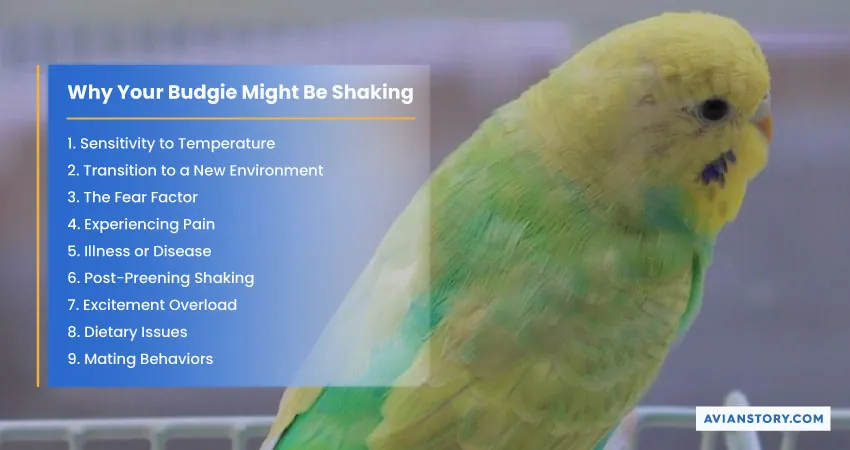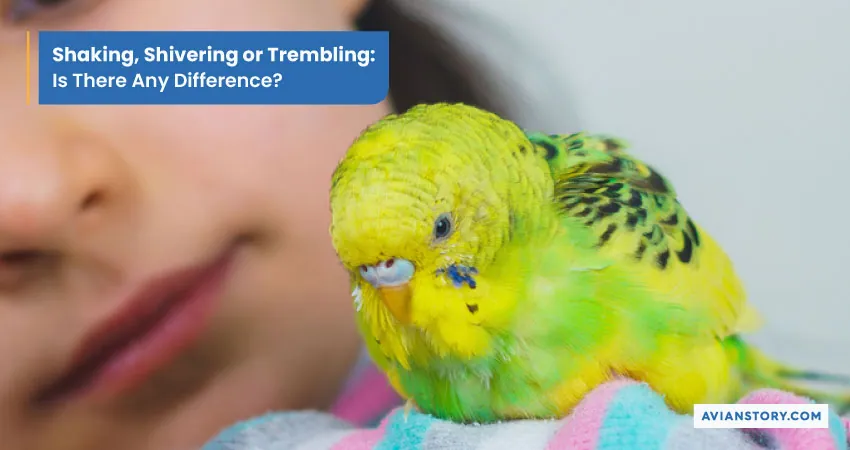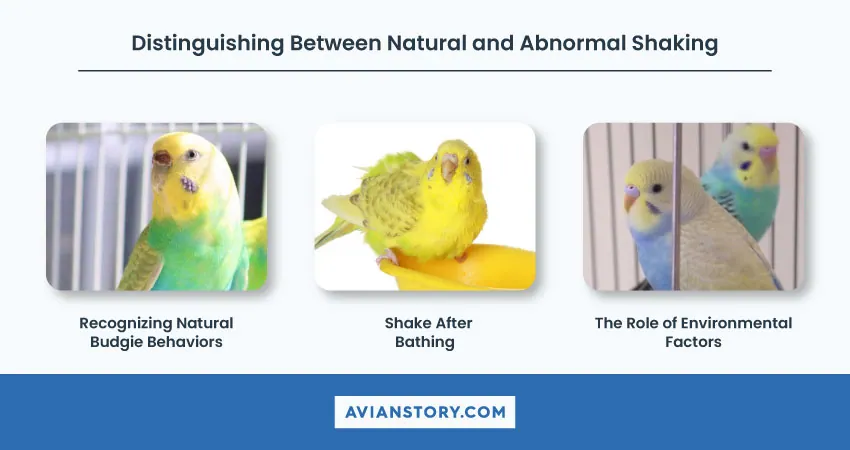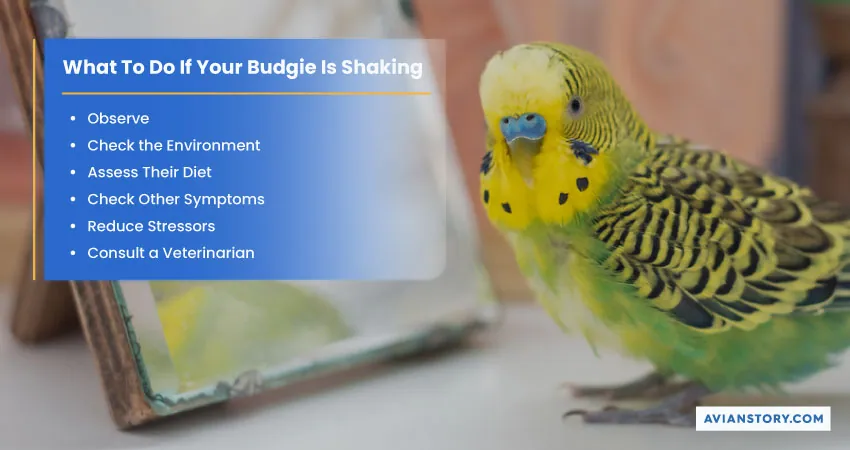Why Is My Budgie Shaking? Trembling or Shivering Explained!
If you keep numerous budgies as pets, you may discover differences in budgies’ personalities, such as eating, climbing, howling, etc. But do you know budgies can shake too?
Now you may ask, why is my budgie shaking? Budgies can shake when something unexpected happens, such as; excessive cold, anxiety, preening, or too much excitement. Besides that, they shake if they are agitated or prepared to fly. Shaking or trembling might also be an indication of severe disease. Therefore, you should take it seriously.
Your budgies could be shaking for a variety of causes. This article will assist you in distinguishing between tremors that are normal and healthy and those that require your attention.
9 Reasons Why Your Budgie Might Be Shaking

Budgie’s body shaking is a reaction to specific stimuli. When your bird’s muscles clench and release quickly, it quivers. These convulsions occur so swiftly that it may appear like a budgie rocking on the spot.
This is an automatic reaction. They do, however, shake on purpose at times. Shaking, however, signifies being overwhelmed by an exterior difficulty or dealing with an interior problem.
There are some 7 possible fundamental reasons why budgies shake.
1. Sensitivity to Temperature
Budgies, or budgerigars, are native to the warm climates of Australia, as noted in a study published in the Australian Journal of Zoology. They thrive in temperatures between 75-85°F (23-29°C). To regulate body temperature, they have certain adaptations as follows.
- Budgies produce heat swiftly by contracting and relaxing their muscles intermittently. This biological action warms the entire body and safeguards their internal organs from chilling.
- Even though budgies possess a thick layer of feathers that they can puff up for insulation, they should not need to shiver unless exposed to extreme cold.
- A shivering budgie might be experiencing exposure to a cold draft, such as an open window or an air conditioner, or an excessively cold room during winter months.
Ensuring a consistent, comfortable temperature in your budgie’s living space is essential. Using a thermostat can help monitor room temperature. Placing the bird’s cage away from drafty windows or air conditioners, and providing warm covers during colder nights, can also aid in maintaining optimal temperatures.
2. Transition to a New Environment
As small and often cautious creatures, budgies might be apprehensive of unfamiliar environments or new caregivers. It is typical for a budgie to feel anxious and start shaking when introduced to a new home or surroundings. Patience and gradual acclimatization can help them adjust to new settings.
A new home, a new cage, or even a rearranged room could be unsettling for a budgie. During this adjustment period, you might observe your budgie shivering or shaking more frequently. This behavior should gradually lessen as your bird gets accustomed to its new surroundings.
When introducing changes, do it gradually. Let your budgie explore new elements at its own pace. Using treats and positive reinforcement can help create a positive association with the new surroundings, easing their stress and reducing shaking.
3. The Fear Factor
Fear can trigger a constant shaking response in budgies. When frightened or tense, their bodies release adrenaline, a hormone produced in response to perceived harm or threat. Loud noises, sudden movements, or physical shocks can induce this adrenaline rush, elevating the bird’s alertness and energy levels.
When the budgie’s body cannot metabolize the excess adrenaline due to rapid movements or exertion, shaking ensues. Consistent shivering might suggest a stressful living environment, indicating that an adrenaline surge might be causing uncontrollable trembling.
Aside from shaking, fear or anxiety in budgies may present as sudden bursts of flight, panicked chirping, or hiding. Regular exposure to stressful situations may also lead to loss of appetite, changes in droppings, and feather plucking.
Ensure your budgie’s environment is calm, quiet, and free of potential threats. Keep your bird’s cage away from predatory pets, and try to minimize sudden loud noises. Familiarity and routine also contribute to a sense of safety for your budgie.
4. Experiencing Pain
A budgie might shake due to pain, particularly if it has been injured. Standing on a wounded foot or strained leg, for example, could lead to muscle tension and intense discomfort. Any injury can heighten the bird’s heart rate, blood pressure, and respiration, putting it on high alert and triggering shaking and shuddering.
Other signs of pain may include changes in posture, lethargy, loss of appetite, and unusual aggressiveness or fearfulness.
If you suspect that your budgie’s shaking is due to pain, it’s vital to seek veterinary assistance promptly. A professional avian vet can properly diagnose and treat the underlying cause of the pain.
5. Illness or Disease
Shivering can be a physiological response when a budgie’s body detects a viral or bacterial infection. The increase in body temperature due to shaking assists in combating the invading pathogens, as noted in a study in the Journal of Avian Medicine and Surgery.
Some common illnesses in budgies that might cause shaking include respiratory infections, digestive disorders, and parasitic infestations. In addition to shaking, these illnesses often present with other symptoms such as respiratory distress, changes in droppings, and loss of weight or appetite.
Regular health checks by an avian vet can help catch potential illnesses early. Coupled with your observations on your budgie’s behavior and habits, it can ensure your feathered friend stays healthy and happy.
6. Post-Preening Shaking
Budgies often shake as part of their routine grooming process, especially after preening. After a refreshing bath, your budgie may shake off excess water and fluff its feathers for drying, which can look like shivering.
7. Excitement Overload
Budgies can also shake when excessively excited. During such episodes, the surge of adrenaline can cause trembling, similar to a fear response. Monitoring your budgie’s behavior can help differentiate between excitement-based shaking and fear-induced trembling.
Maintaining a calm, stable environment can help manage your budgie’s excitement levels. This involves providing a balanced diet, enough exercise, and mental stimulation in the form of toys and interaction.
8. Dietary Issues
A balanced diet is vital for your budgie’s health. Poor nutrition can lead to shaking and other health problems.
Budgies require a balanced diet of seeds, pellets, fruits, vegetables, and clean water. A diet deficient in essential nutrients can lead to malnutrition and cause symptoms like shaking. For instance, a calcium deficiency can lead to brittle bones and shaky movements.
Ensure your budgie gets a variety of foods, with a mix of seeds, specially formulated pellets, and fresh produce. Foods high in calcium, like broccoli and kale, can be particularly beneficial. Always ensure your budgie has access to fresh, clean water.
9. Mating Behaviors
The shaking behavior in budgies isn’t always a sign of distress. In some cases, it may be a part of their courtship rituals.
Male budgies often shake their bodies and bob their heads as part of their mating dance to attract females. Female budgies may shake as a response to show they are ready to mate.
Aside from shaking, signs of mating readiness include increased preening, singing, and mutual feeding. The female may also start to prepare a nest.
Shaking, Shivering or Trembling: Is There Any Difference?

In colloquial usage, terms like shaking, shivering, and trembling are often used interchangeably when describing a budgie’s actions, all suggesting a rapid, back-and-forth movement. However, they can each subtly imply different situations or conditions, especially from a veterinary perspective.
- Shaking: Budgies often shake or ruffle their feathers as part of normal behavior. This could be after preening (cleaning their feathers), a bath, or waking from sleep. It’s akin to a little stretch and allows them to realign their feathers. They also shake as a way to relieve tension or adjust their plumage.
- Shivering: Shivering in budgies often looks like very fast, tiny shakes and may be a physiological response to cold temperatures, similar to how humans shiver when cold. If your budgie is shivering, it’s worth checking the ambient temperature, as it may be too low.
- Trembling: Trembling might be indicative of fear, stress, or anxiety. It’s often observed in conjunction with other signs of distress, such as a puffed-up appearance, rapid breathing, or changes in vocalization. It can also be a symptom of certain health problems, including neurological conditions.
That being said, it’s important to note that these are general observations, and there is considerable overlap between these terms. Always take into account the entire context, such as the budgie’s overall behavior, health status, and environmental conditions. If the shaking, shivering, or trembling is continuous, severe, or accompanied by other signs of illness, consult with a veterinarian immediately.
Distinguishing Between Natural and Abnormal Shaking

Observing your budgie’s behavior closely can help you distinguish between normal and abnormal shaking. Certain types of shaking are typical, linked to their natural behaviors, or environmental factors.
Recognizing Natural Budgie Behaviors
Preening, bathing, and stretching are all natural activities that may cause your budgie to shake. Budgies preen their feathers to clean them and to distribute protective oils. After preening, they often shake to realign their feathers. Similarly, they shake after bathing to shed excess water and again after stretching to relax their muscles.
Why Does Budgie Shake After Bathing?
Budgies sometimes shake to adjust their body temperature. That means a bird bath may cause shaking. So when your budgie gets cold after a bath, they shake to warm up again. Another factor is that a bird will shiver after a wash to let the air flow through its wet feathers and dry them off.
Let’s see how you give your budgies a bath and how they react, enjoy, and shake during the whole process:
The Role of Environmental Factors
Environmental factors such as sudden noises, changes in the environment, or the presence of a perceived predator may cause a budgie to shake due to fear or stress. This shaking is usually temporary and subsides once the source of stress is removed.
What Is Causing My Baby Budgie To Shake?
Baby budgies may appear to shake, although this is mainly due to their learning to control their body muscles. Another cause is the sight of budgies wobbling and trembling as they begin to move and walk. The budgie may appear to be shivering during this procedure.
Baby budgies require a continuously warm environment to survive. So they need to stay warm is necessary. However, warmth maintenance is typically the mother budgie’s responsibility. So when baby budgies stay alone, are exposed to too much cold around, and cannot warm themselves, they shake.
What To Do If Your Budgie Is Shaking?

When your budgie is shaking uncontrollably, you should first help ensure nothing is alarming them.
- Observe for Context:
- Natural Behaviors: Budgies might shake off excess water after a bath or realign their feathers after preening.
- Environmental Factors: They might tremble because of temperature fluctuations or sudden noises. Ensure their environment is stable.
- Stress or Fear: Changes in the environment, loud noises, or the presence of other animals might stress them out.
- Health Concerns: Continual shaking with other symptoms like loss of appetite or lethargy might indicate illness.
- Check the Environment:
- Make sure the room temperature is comfortable. Budgies are most comfortable at room temperatures between 65 and 75 degrees Fahrenheit (18 – 24 degrees Celsius).
- Ensure there aren’t any direct drafts hitting the cage.
- Check for sudden noises or changes in the environment that might be causing stress.
- Assess Their Diet:
- A poor diet can lead to malnutrition and shaking. Ensure your budgie is getting a balanced diet of seeds, pellets, and fresh fruits and vegetables.
- Always provide fresh water.
- Look for Other Symptoms:
- If shaking is accompanied by other symptoms like changes in droppings, difficulty breathing, loss of appetite, or lethargy, it could indicate a health issue.
- Reduce Stressors:
- Remove any potential stressors or threats from the environment.
- If you’ve recently introduced a new bird or changed the cage setting, give your budgie time to adjust.
- Playing soft music or providing toys can sometimes help alleviate stress.
- Consult a Veterinarian:
- If the shaking continues without a clear reason or if it’s accompanied by other signs of illness, it’s crucial to consult an avian veterinarian.
- Regular check-ups can help detect and prevent potential health problems.
- Keep a Routine:
- Budgies thrive on routine. Keeping a consistent schedule for feeding, playtime, and rest can help them feel secure.
- Provide Social Interaction:
- Budgies are social birds. If you have only one budgie, ensure you’re spending enough interactive time with it. If considering getting another budgie for companionship, make sure you’re prepared for the responsibility and introduce them slowly and safely.
- Maintain a Clean Environment:
- Regularly clean the cage, change the water, and provide fresh food. A clean environment can prevent many health issues.
When Should I Be Concerned About My Budgie Shaking?
Not all shaking is cause for alarm, but there are some red flags you should be aware of.
If your budgie is shaking continuously, seems lethargic, has changes in appetite, or exhibits any other abnormal behaviors, it’s best to consult with a veterinarian.
When to Seek Veterinary Attention
Immediate veterinary attention should be sought if your budgie’s shaking is accompanied by any of the following symptoms:
- Diarrhea
- Weight loss
- Labored breathing
- Change in droppings
- Change in behavior
These symptoms may indicate a serious health problem that needs to be addressed.
Frequently Asked Questions
Here are some of the questions and answers that will tell you something more about budgie’s shaking.
Why is my budgie shaking his wings?
Budgie’s wing fluttering is typical; this is how your bird stretches or sheds bothersome feathers from its body. This rash shouldn’t stay too long and probably won’t be the only symptom you experience. You may also wonder why is my budgie shaking one wing only. In that case, he’s probably preening and shaking one wing out to realign the feathers.
Why is my budgie shaking his head?
Head shaking is typically a bad sign for budgies. Sometimes, anxious bodies will shake their heads before or right after vomiting. If they experience neurological impairment, they could also shake their heads.
Why is my parakeet shaking its tail?
The shaking or bobbing of a budgie’s tail can indicate various things, ranging from normal behavior to signs of illness or distress. Here’s a brief explanation of some potential reasons for your budgie’s tail shaking.
Normal Breathing or Exercise: It’s common for a budgie to move its tail during breathing, especially after flying or exercising. This should stop once they’ve rested.
Emotional Response: Budgies express their feelings through body language. Tail shaking can indicate happiness or excitement, but if it’s combined with signs of distress, it could mean fear or stress.
Health Issues: Respiratory illnesses can cause a budgie’s tail to shake heavily as they struggle to breathe. If the shaking is constant, and there are other signs of sickness (changes in eating or drinking habits, lethargy, etc.), consult a vet immediately.
Temperature Regulation: Budgies sometimes ruffle or shake their feathers to regulate their body temperature. However, if this behavior is continuous, it might signal an underlying health problem.
In any case, if your budgie’s tail is persistently shaking, it’s recommended to consult a veterinarian.
Final Thoughts
Last but not least, you shouldn’t worry too much if you ever see your budgie’s wings or tail shaking. You must pay attention to if your budgie’s complete body is shaking.
Check if they are warmed and searching for something to shock them. If you can’t uncover a clear cause for your pet’s behavior and it continues to cease, we recommend consulting with a vet to ensure he’s not critically ill.
